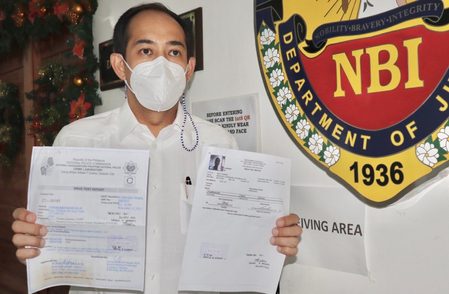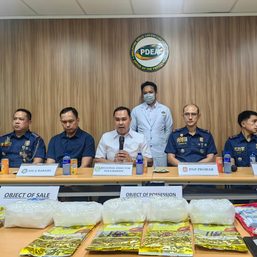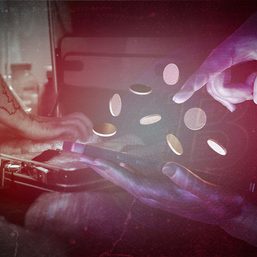SUMMARY
This is AI generated summarization, which may have errors. For context, always refer to the full article.
![[OPINION] Cocaine use is an election issue](https://www.rappler.com/tachyon/2021/11/Prevalence-of-drugs-Philippines-November-11-2021.jpg)
Several weeks ago, President Rodrigo Duterte expressed serious concern about a presidential candidate using cocaine, a powerful stimulant that is addictive and illegal. He did not identify the candidate nor did he disclose whether this candidate is still actively using this illegal drug. Surely, he would not make this accusation without evidence at his disposal.
Let me state at the outset that I am strongly opposed to President Duterte’s war on illegal drugs, primarily crystal methamphetamine or shabu. It has been marked by the loss of thousands who were killed due to suspicion of being a drug dealer or user. Users of illegal drugs or even drug dealers are our fellow human beings and are entitled to due process of law. No one has the right to take another’s life. The violent, cruel, and senseless deaths have caused unresolved grief and sustained emotional trauma to the spouses and children left behind. People addicted to drugs, legal or illegal, need rehabilitation through counseling and medical intervention. They deserve a second chance.
Cocaine is a powerful addictive stimulant drug similar to crystal meth or shabu. Initially people use it hoping to acquire a pleasurable or euphoric experience. They become widely alert and get a sense of great confidence. It takes away social inhibitions and makes it easier for them to interact. This is brought about by the massive, abnormal accumulation of dopamine, a neurotransmitter in the brain responsible for alertness, a sense of well-being, and high energy with better focus and concentration.
The brain has billions of neurons. They transmit messages through chemicals known as neurotransmitters. Dopamine is one neurotransmitter. The normal brain transmits message from one neuron known as the presynaptic neuron, and is received by another neuron known as the postsynaptic neuron. The neurotransmitters are released in space and taken back by transporters to the presynaptic neuron once the message has been sent. What cocaine does is prevents the taking back or reuptake of this chemical, resulting in abnormal levels of dopamine and thus heightening the pleasurable experience and alertness. When taken too much or over time due to prolonged use, it causes anxiety, irritability, insomnia, anger outbursts, and mood swings. Repeated use can cause brain changes irreparable brain damage. Overdosing on cocaine can cause strokes, seizures, or even death.
The cocaine user, after experiencing the initial euphoria or ” good feeling,” now craves to have the intense pleasurable experience for the second time. This will lead to a vicious cycle as absence of cocaine will lower the levels of dopamine, leading to a letdown or dysphoric mood. They will then take cocaine again hoping to get the experience, but it will take more amounts of cocaine to get the pleasurable sensation. The user then develops tolerance wherein they need to use a higher dose, hoping to get a similar effect, but eventually it will not work. Apparently, the receptors from postsynaptic neurons get severely damaged from prolonged use of cocaine. They then suffer from withdrawal, and in some cases they experience reverse tolerance, where instead of feeling pleasurable sensations, they become suspicious and paranoid, leading to a psychosis with auditory hallucinations.
Long-term use of cocaine can also cause damage to the heart, as it can cause high blood pressure and elevated heart rate. It can cause myocardial infarct and brain hemorrhage. It can cause movement disorders such as Parkinson’s disease or even dementia. Studies have shown that it causes cognitive impairment such as diminished focus and concentration, poor impulse control, and impaired memory. It is also important to know that former cocaine users are at high risk for relapse when they are under considerable distress or in a social environment where they are reminded about the use of cocaine in prior similar settings.
It is for this reason that I am gravely concerned by this information provided by the president. In a democracy, every person has the right to run for public office if he meets the requirements set by our Constitution and Election Code. However, electing this person to the highest position of the land places at great risk the lives of our people as well our national interest and security. For if this is true, he is compromised, and such information can be used by our foreign adversaries.
Can we place our trust in a leader to make good decisions, create policies, and oversee government agencies if he has mood swings, anxiety, depression, insomnia, irritability, and cognitive impairment? Analogies to this concern are the following: Will you hire a driver to bring your children to school if he uses cocaine or had used it? Will you board a plane if the pilot is using cocaine or had used it ? Will you hire a person to manage your company if he uses cocaine or has used it? Will you hire a contractor to build your house if he uses cocaine? Certainly, you will not. How much more electing the president of our country, whose decisions can affect millions of lives and the security of our nation?
One who seeks public office has a responsibility to inform the voters about his medical and psychological condition; if this person does not come forward with this information, then it is the duty of those who have such information to inform our people. This brings us to President Duterte’s revelation about one candidate having a history of using cocaine. If he has that information and I am sure he has, being privy to the best intelligence about the presidential candidates, then he has a duty to our people and our nation to name that person.
I ask our citizens to demand such disclosure as this is a serious election issue. All candidates should disclose their medical history to include substance abuse history. They should volunteer for random drug tests that will include blood and urine samples as well as hair follicle tests that can detect traces of illegal drugs such as cocaine for several months after the user becomes abstinent or drug-free. We, the people, expect our candidates to be transparent and come clean. We urge the media to investigate this issue and for our people not to vote for this person. Our people will suffer for the next six years if we have a leader who is too emotionally unstable and mentally incompetent to perform the tasks expected of the country’s top elected official. – Rappler.com
Dr. Jessy Ang is a Filipino-American psychiatrist. He finished his medical schooling at the University of Santo Tomas in Manila. He had a private practice for more than 30 years in general adult psychiatry with a primary interest in psychopharmacology. He is a motivational speaker as well as healthcare advocate for universal health care and better treatment for the mentally ill in the Philippines.
Add a comment
How does this make you feel?



![[WATCH] Mary Jane Veloso’s mother pleads Marcos, Jokowi anew: Free my daughter](https://www.rappler.com/tachyon/2024/01/mary-jane-veloso-cesar-celia-protest-clemency-january-10-2024-005-scaled.jpg?resize=257%2C257&crop=717px%2C0px%2C1706px%2C1706px)






![[Free to Disagree] Sabwatan ng mga doktor at drug companies](https://www.rappler.com/tachyon/2024/04/tl-sabwatan-doktor-drug-companies-April-22-2024.jpg?resize=257%2C257&crop=292px%2C0px%2C720px%2C720px)


![[The Slingshot] Alden Delvo’s birthday](https://www.rappler.com/tachyon/2024/04/tl-alden-delvo-birthday.jpg?resize=257%2C257&crop=263px%2C0px%2C720px%2C720px)
![[EDITORIAL] Ang low-intensity warfare ni Marcos kung saan attack dog na ang First Lady](https://www.rappler.com/tachyon/2024/04/animated-liza-marcos-sara-duterte-feud-carousel.jpg?resize=257%2C257&crop=294px%2C0px%2C720px%2C720px)
![[Newsstand] Duterte vs Marcos: A rift impossible to bridge, a wound impossible to heal](https://www.rappler.com/tachyon/2024/04/duterte-marcos-rift-apr-20-2024.jpg?resize=257%2C257&crop=278px%2C0px%2C720px%2C720px)


![[Rappler’s Best] Patricia Evangelista](https://www.rappler.com/tachyon/2024/04/unnamed-9-1.jpg?resize=257%2C257&crop=486px%2C0px%2C1333px%2C1333px)


There are no comments yet. Add your comment to start the conversation.